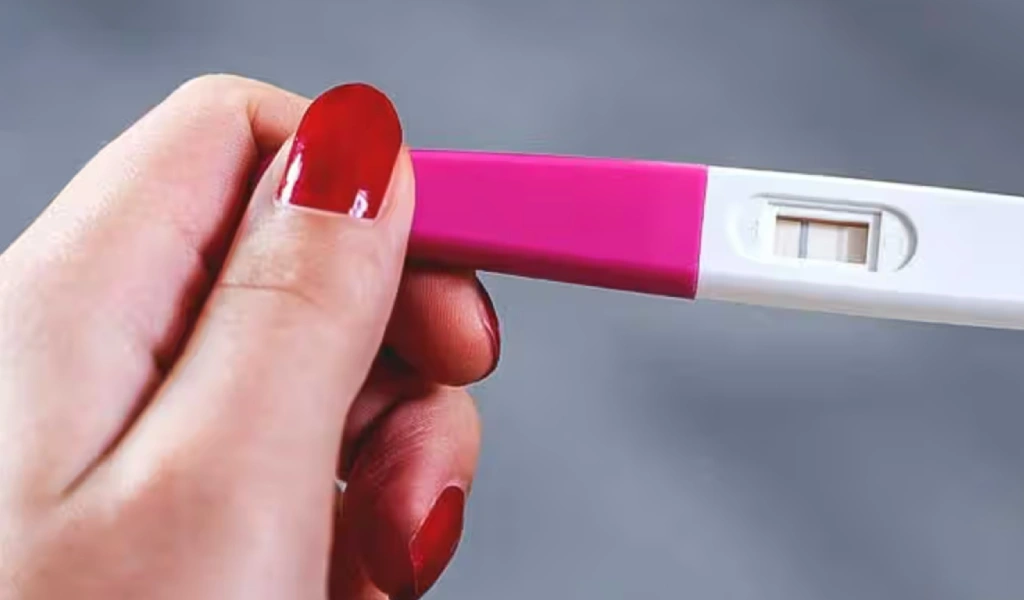Additional tests should be conducted to confirm the pregnancy results, as multiple reasons could lead to false-positive pregnancy results.
A home pregnancy test (HPT) is commonly used to quickly determine pregnancy. It is a popular choice among women because it allows for privacy. However, there is a possibility of receiving a false-positive result with a home pregnancy test.
Yes, it is possible and could result in significant confusion. Although occurrences of false-positive results of pregnancy are very uncommon, they do occur, and there are likely multiple explanations for them.
Keep on reading this article ‘Top Reasons For False Positive Home Pregnancy Tests’ for more information on HPT, including different reasons for false positive results and strategies to avoid them.
How does the process of high-performance testing (HPT) function?
To understand why a home pregnancy test can give a false positive pregnancy result, it is crucial to have a clear understanding of the mechanism behind how an HPT operates.
Throughout pregnancy, the body generates a hormone called Human Chorionic Gonadotropin (HCG), commonly referred to as the pregnancy hormone. Pregnancy tests taken at home identify the existence of this hormone in the urine. A positive outcome suggests a notable amount of HCG in the body, which is later expelled through urine.
Why do false positive results occur on home pregnancy tests?
It is uncommon to receive a false positive on a home pregnancy test, however, certain reasons may cause it to occur.
1. Assisted Reproductive Technology
Experiencing infertility can be emotionally distressing, particularly when faced with a false positive result during efforts to conceive, which can deeply affect one’s morale. However, in cases where fertility treatment involving hCG injections is being pursued, the occurrence of a false positive result is plausible. This is due to the detection of residual hCG from the administered injections by the home pregnancy test.
2. Evaporation Line
Some pregnancy tests may show an evaporation line if the urine crosses the test strip. Typically, the color changes as the urine passes, making it easier to read the test results. A positive test will show a color change and a visible line during the recommended testing time. However, if there is no line and additional light is needed to see it clearly, it could be an evaporation line. This can occur when the test result is read after the recommended 10-minute timeframe.
3. Testing is done in an incorrect manner
The majority of women who receive a positive result on a pregnancy test will indeed be pregnant, but there are a small number who are not.
Incorrect interpretation of the test is the primary cause of an inaccurate positive outcome on a pregnancy test. It is imperative to meticulously adhere to the instructions accompanying the home pregnancy test. Before conducting a pregnancy test, it is critical to thoroughly study the guidelines issued by the manufacturer.
Most pregnancy tests require you to check the results after precisely 3 minutes and not to interpret them after 10 minutes have passed. If the pregnancy test shows a negative result after 3 to 5 minutes, it should be disposed of. Any positive result that appears after the specified time frame cannot be considered accurate.
Adhering to the directions provided on the HPT is crucial. Neglecting them could result in building up hope only to have it shattered in the end.
4. The occurrence of Early Pregnancy Loss is attributed to the failure of the fertilized egg to implant correctly within the uterus.
One of the most devastating reasons for a false positive result is a chemical pregnancy. During a brief period, your body may give the impression that you are pregnant, but the embryo does not properly attach to the uterus. This can occur before you even realize you have missed your period. Often, what some women think is a delayed period or abnormal menstrual cycle turns out to be the conclusion of a chemical pregnancy. The likelihood of a false positive due to a chemical pregnancy increases if you conduct a pregnancy test before the expected date of your period.
5. Specific Health Conditions
Some medical conditions may lead to a false positive pregnancy test result, although this is not typical. Conditions such as ectopic pregnancy, menopause, ovarian cysts, and rare medical issues can result in inaccurate results. Specific types of cancer, such as choriocarcinoma, breast, ovarian, and testicular cancers, can also produce hCG and cause a false positive result.
6. Drugs
If you are on specific medications like methadone, chlordiazepoxide, or promethazine, you might get inaccurate positive results on pregnancy tests. It is important for women taking hCG injections or undergoing fertility treatments to speak with their healthcare provider regarding the reliability of at-home pregnancy tests. This is because these medications can affect the test results by tainting the urine with blood or high levels of drugs.
7. Flawed Pregnancy Examination
Ensure to always check the expiration date of a home pregnancy test (HPT) before using it. False positive results are often linked to expired tests. It is common to receive inaccurate results from a defective pregnancy test, leading to false positives.
8. Unpurified Urine Specimen
Most pregnancy test kits include cups for collecting urine samples. It is important to thoroughly wash the cup before use to avoid contaminating the sample with soap or detergent residue. It’s worth mentioning that the cups are already sterile and don’t need to be washed before use.
9. The human chorionic gonadotropin produced by the pituitary gland
The production of hCG by the human pituitary gland is typically low. This hormone is usually found at higher levels in women going through menopause. Therefore, if you are above the age of 40 and receive a false positive result on a pregnancy test, you can attribute it to your pituitary gland.
10. Infection of the Fallopian tubes and ovaries
Some women with tubo-ovarian abscesses may also have false positive home pregnancy tests. Women with pelvic inflammatory disease frequently face this significant reproductive health problem.
11. Antibodies
Some women have specific antibodies in their blood, like heterophile antibodies, that can disrupt a home pregnancy test and result in inaccurate positive results.
12. Hemodialysis
If you have a kidney disease and are receiving Hemodialysis treatment, you might encounter a false positive result on a pregnancy test.
What steps can be taken to prevent a false positive test outcome?
It is not common to receive incorrect positive pregnancy results. Many healthcare professionals suggest taking two home pregnancy tests to verify if you are pregnant. Using various brands of tests can lower the chances of misinterpreting the results.
Home pregnancy tests are generally considered to have a 99% accuracy rate when administered correctly. Nonetheless, it is crucial to recognize that a positive result may occasionally be deceptive. The precision of the test can also be affected by the timing of its administration. It is advisable to wait until post missing a menstrual period before conducting the test. Performing the test in the morning is recommended, as hormone levels tend to be at their peak during this time of day.
False-positive pregnancy results are not very common but can happen, particularly with home pregnancy test kits. Fertility treatments, improper testing, defective test kits, tainted urine samples, specific medications, and certain medical conditions can all contribute to a false-positive result. To reduce the risk of false positives, it is important to carefully follow the test instructions, not hold onto the test, and discard it if it displays a negative result. If you suspect the test is incorrect, it is recommended to schedule an appointment with a gynecologist for a professional evaluation to confirm the result.
Key Pointers of ‘Top Reasons For False Positive Home Pregnancy Tests’
- A home pregnancy test identifies the existence of Human Chorionic Gonadotropin.
- During pregnancy, HCG, a hormone also referred to as gonadotropin, is produced.
- False positives are frequently a result of fertility treatments or inadequate testing.
- False positive results may occur due to inaccurate timing, expired tests being used, or a contaminated urine sample.
- Other factors that could result in inaccurate positive results are specific health issues, prescribed drugs, or a biochemical pregnancy.
- It is advisable to consult with a physician and undergo a blood test for more accurate confirmation in determining pregnancy status in women.



























